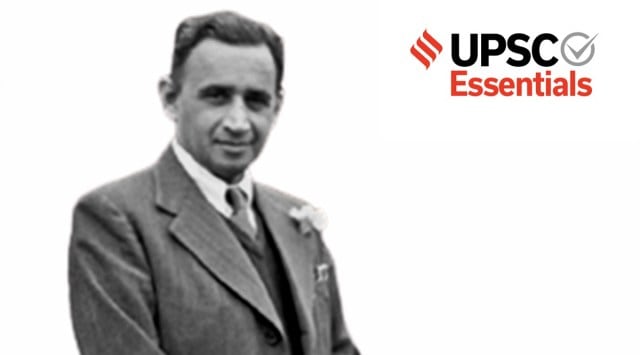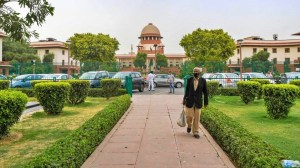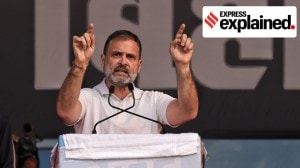- India
- International
UPSC Essentials: Get inspired- Lessons from the life of CD Deshmukh
CD Deshmukh was one of the most industrious and inspirational personalities of his time. His integrity and sense of dedication were of the highest order by any standard, in India and abroad.
 CD Deshmukh, the first Indian to be appointed Governor of the Reserve Bank of India by the British Raj was an economist. (Express)
CD Deshmukh, the first Indian to be appointed Governor of the Reserve Bank of India by the British Raj was an economist. (Express)Essential lessons from the life journeys of great personalities for GS IV, essay, enriching the Mains answer, interview and for the life of a UPSC aspirant in general.
Aspirants must study the journey of great leaders, administrators and reformers not only for the UPSC examination but also in order to remain motivated in their own journey of preparation for the civil services and beyond. Here is one such personality whose life teaches us many values:
CD Deshmukh was one of the most industrious and inspirational personalities of his time. His integrity and sense of dedication were of the highest order by any standard, in India and abroad.
Who was Sir CD Deshmukh?
CD Deshmukh, the first Indian to be appointed Governor of the Reserve Bank of India by the British Raj was an economist. He had been a great scholar, proficient in several languages, an economist, a far-sighted thinker, a great visionary, and a distinguished administrator. He had many feathers in his cap. He had an opportunity to work as one of the secretaries in the second-round table conference in which Mahatma Gandhi participated. He later served as the finance minister in the Union Cabinet. Deshmukh also worked as Chairman of UGC, Vice-Chancellor of Delhi University, President of Indian Statistical Institute, Honorary Chairman of National Book Trust, President of Indian Statistical Institute, and Honorary Chairman National Book Trust. He founded India International Centre in 1959 and served as lifetime President of it. He was also the chairman of the Institute of Public Administration.

How did Bal Gangadhar Tilak influence Deshmukh’s decision to join the Indian Civil Services (ICS)?
Speaking in 1956, Deshmukh said, “You may be interested in how I joined the ICS. I was sent to compete for that Service, and when I completed my studies, I went to see Sri Bal Gangadhar Tilak, who then happened to be in London, to ask his advice about my future; it may be recalled that in those days there was much talk about Swaraj and Non-cooperation and among other men, I thought that I should see him. His reply was that everyone must judge for himself what contribution he could make to the cause of the country and that each one should decide as to where his duty lay. If I felt that I could not cut much ice in politics, but that I could make a better contribution to the welfare of the country by participating in its administration at its highest level, it was for me to make that choice. Thereafter my choice was inevitable. I would like to tell you that I have no regrets, and I am proud and happy at the opportunities my chosen career has furnished me for service to the country …” (The Importance of Being Deshmukh, Sudarshan V. Desai). Thus, Tilak’s advice helped Deshmukh to make a decision for his career and serve his country to the best of his abilities.
Interestingly, in his autobiography titled The Course of My Life, Deshmukh mentions his ICS examination scoring pattern and that he stood first despite a deduction of 60 marks for bad handwriting. One could definitely do well if he or she has the right knowledge and attitude. An obstacle like bad handwriting will not lead to failure. Something students with bad handwriting can feel happy about.
What was the most significant feature of Deshmukh’s stewardship as a governor of RBI?
As governor of RBI, the most significant feature of Deshmukh’s stewardship was his vigilant assertion of its independence, particularly from the Government of India, and its finance department. The history of RBI recounts some of these episodes, such as Deshmukh’s firm rejection of the suggestion of the Department that the RBI should hold consultations with the government on the allocation of its profits and on his sharp reaction to the comments of the Finance Secretary on the drafts of the Governor’s speech as unacceptable. This was when he took charge as RBI governor. The second world war was at its zenith and so was inflation. “It is notoriously dangerous to change horses in midstream, and the anxiety of the Finance Department to ensure that the new mount would not sink with them in the stream was understandable,” said Deshmukh. Deshmukh exemplified and succeeded as a determined diplomat both in letter and spirit.
What were Deshmukh’s achievements as the Union Finance Minister?
His stewardship as Union Finance Ministry was a remarkable success: stable prices, recognition in international financial councils, the establishment of some consensus about national economic policies, and a memorable performance in what was perhaps the golden age of the Indian Parliament. His stewardship of the country’s finances was marked by prudence as well as a humane perspective and vision in dealing imaginatively with the changing needs of a developing country. His financial policy was directed towards the facilitation of the achievement of rapid growth, social justice, and economic stability.
What was remarkable about Deshmukh as an educationist and as an administrator?
Deshmukh proved to be a good educationist. After observing what was done in good universities abroad, he proposed practical solutions and viable schemes. He left an abiding impression on everything he did, which was characterized by objectivity and impartiality. He was the first ICS officer to be appointed as Governor of RBI due to his brilliance and intellectual acumen. He was eminently successful as an administrator because he selected his people carefully, delegated authority to them, and took the blame on himself when things went wrong. He was absolutely impartial and just. He had the courage to face situations and do the right things. One such incident which is very famous about Deshmukh is of asking an ambassador to pay for purchases that were strictly personal, notwithstanding the fact that the ambassador was a very close friend of the then PM.
How is CD Deshmukh described globally and in the professional world with respect to his ethics?
The three important adjectives associated with CD Deshmukh were dignity, ability, and reasonableness. It is said that John Maynard Keynes was so impressed by the “dignity, ability and reasonableness” of Deshmukh that he recommended Deshmukh head the IMF as its first managing director a suggestion that was however rejected by the United States.
Sudarshan V.Desai in an introduction to CD Deshmukh: Life and Times writes:
“What Deshmukh’s life and career show are that goodness is feasible and practical- and desirable- under all conditions. It is not as if Deshmukh did not receive his own share- and more- of the failures and frailties of people around him. He was also exposed to temptation and met with duplicity, frustration, and disappointment, but he did not allow these setbacks to deter him or disable him, leave alone regarding them as acceptable. He did the right thing as he saw it and did not change his stance or standards.”
What lessons can we learn from the life of CD Deshmukh?
CD Deshmukh was an unusual synthesis of the old and the new, of culture and science and of administration and finance. He possessed a combination of qualities which is rare idealism and objectivity, a high sense of duty, sound practical sense, and a capacity for enthusiasm, catholicity, and imagination. Above all, his integrity and sense of dedication were of the highest order by any standard, in India and abroad. Once in a conversation with his brother Ram on the philosophy of detachment from the cycle of birth and death, Deshmukh said- “I would rather be born again and again so as one would be able to finish all the work one wants to do and did not get the time for it.” This reflects his industrious nature, ambitious character, enthusiastic spirit, and diligent attitude towards life and his work. These are powerful and deep words that tell us a lot about Deshmukh’s personality.
(Sources: The Importance of Being Deshmukh- Sudarshan V. Desai, The Course of My Life- C.D.Deshmukh, rbi.org.in)
Apr 25: Latest News
- 01
- 02
- 03
- 04
- 05







































